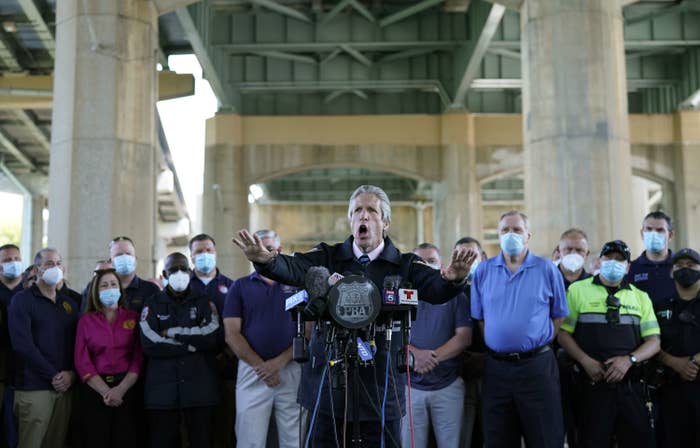
A federal judge has granted a request from unions representing New York City Police Department officers, corrections officers, and firefighters to halt the release of decades of disciplinary records to the public.
In June, New York state legislators repealed a law — known as 50-a — that had kept those records hidden from view and, some argued, allowed some cops involved in serious misconduct to avoid scrutiny. But eight public employee unions, including the Police Benevolent Association, sued last week, arguing that the publication of records related to unsubstantiated or unfounded complaints would violate officers’ collective bargaining agreements as well as their right to due process.
Late on Wednesday, US District Court Judge Katherine Polk Failla ruled that the records should remain under lock and key until the court can fully consider the merits of the suit, which seeks a permanent injunction on releasing the records. Allowing their disclosure before that time, she said, could irrevocably harm officers, rendering the entire case moot.
Her ruling upholds the decision of a New York state judge last week to issue a temporary restraining order that froze the release of any unsubstantiated or unfounded complaints until the case could be moved to federal court in the Southern District of New York.
The rulings appear to slam the brakes on a plan by New York City Mayor Bill De Blasio to publish what he called a “massive” public database of NYPD disciplinary records beginning this month. The mayor revealed that project just five days after legislators repealed 50-a, amid nationwide protests over the killing of George Floyd by Minneapolis police officers. That law, originally passed in 1976, has increasingly been used to shield police from having any of their disciplinary records ever come to light.
In the month since the law was repealed, however, some of those records have already been released under New York’s Freedom of Information Law. In her Wednesday decision, Judge Failla also barred the New York Civil Liberties Union from releasing some 81,000 officers’ records it received through a public records request to the Civilian Complaint Review Board, an independent agency charged with investigating allegations of police misconduct.
The judge turned her attention to the NYCLU after an attorney representing New York City said that the nonprofit had received the records earlier this month. After an attorney for the advocacy group refused her request to voluntarily consent not to disseminate the files, Judge Failla formally ordered the NYCLU not to do so.
The attorney, Chris Dunn, expressed shock at the order and voiced the belief that the NYCLU could not be blocked from releasing documents it had legally obtained through a public records request. The group, which is not a party to the suit, said it intends to immediately challenge the court’s decision.
“I don’t believe there is any basis for any order,” Dunn told the judge. “In all my years of practice, I have never seen this.”
Two years ago, a BuzzFeed News investigation based on hundreds of internal disciplinary records revealed that the NYPD’s secretive disciplinary system was often arbitrary, allowing cops repeatedly found guilty of serious misconduct to keep their jobs while forcing out other officers who blew the whistle or committed lesser offenses. The records used in that investigation are publicly available in a searchable database.
Judge Failla said she would revisit her decision at a hearing on the injunction in mid-August.
